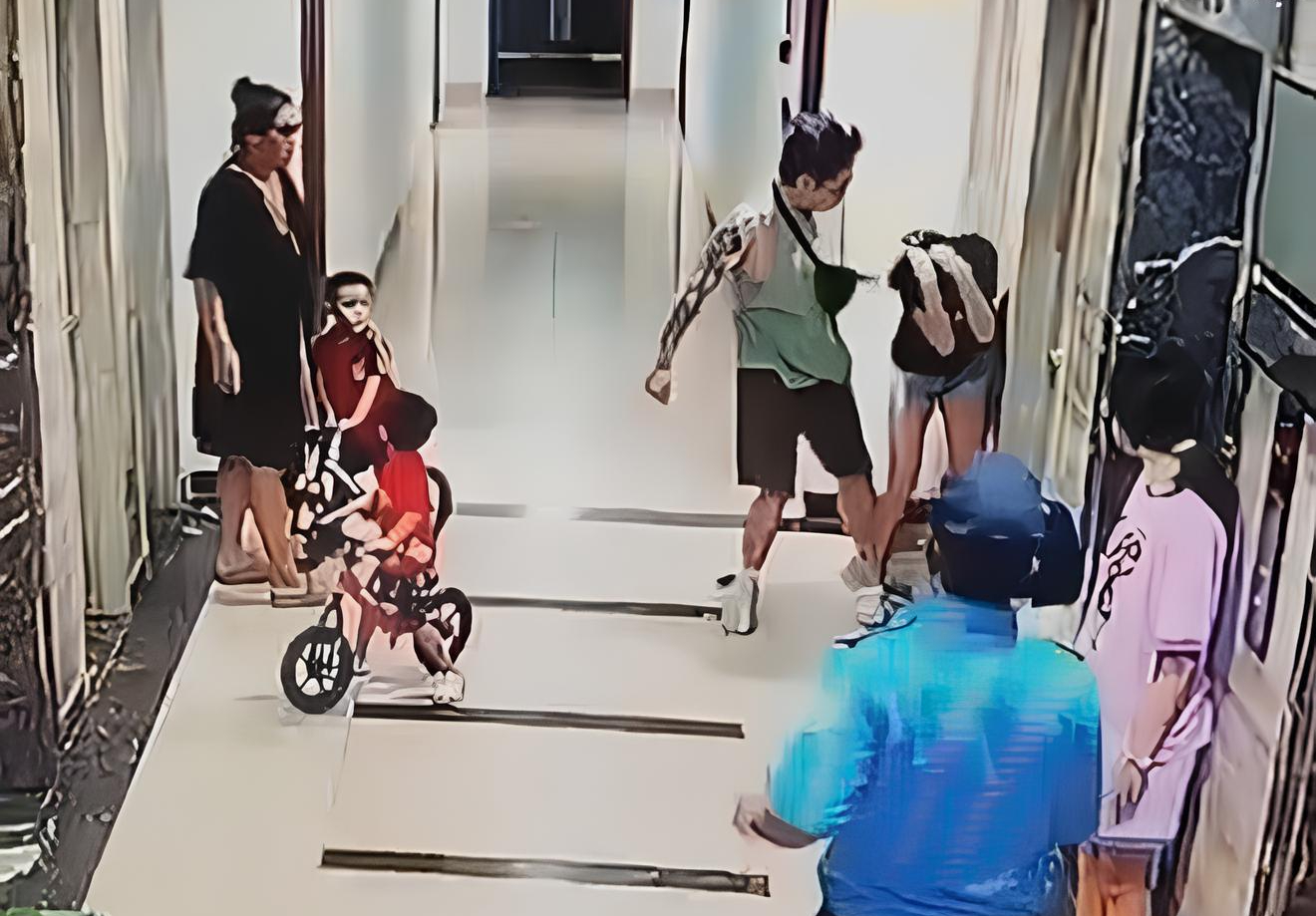At 10:30 PM on 9/8, a woman and her child were blocked from entering an elevator in the lobby of the Sky Central apartment building in Dinh Cong, Hanoi. After a brief argument, 31-year-old Dang Chi Thanh repeatedly struck the woman in the face. She retreated, but he pursued her until security intervened.
The assault, lasting less than a minute, sparked days of online discussion. Thousands commented, expressing outrage at the man's violence, questioning the wife's apparent indifference, and even advising women to be submissive. Some dismissed the incident as rare, claiming "normal men don't hit women".
 |
The man assaulting a woman at the Sky Central apartment building (Dinh Cong) at 10:30 PM on 9/8. Image from security camera footage. (Camera footage) |
The man assaulting a woman at the Sky Central apartment building (Dinh Cong) at 10:30 PM on 9/8. Image from security camera footage. (Camera footage)
Psychologists say this incident raises three key points.
First, the Dinh Cong incident is not isolated. "Violence against women remains a persistent problem in Vietnamese society", said Dr. An Thanh Ly, a lecturer at Hanoi Medical University.
While some may view this as an aberration, statistics tell a different story. The 2019 National Study on Violence against Women found that 63% of Vietnamese women have experienced some form of violence. Over one-third have experienced physical or sexual violence from a partner, and 11% have been assaulted by a man who was not their husband or boyfriend.
The Dinh Cong incident gained notoriety due to the video footage, which vividly captured the aggression. The victim and assailant were practically strangers. Moreover, the victim bravely spoke out – a rare act, considering 90% of victims remain silent.
Second, the saying "it's cowardly for men to hit women" masks underlying gender inequality. Boys are often raised being told "don't hit girls," a rule initially based on physical differences but often extended to intellectual and emotional realms. In professional settings, men can engage in direct conflict with each other, but are often labeled "petty" or "effeminate" if they do so with women.
According to Nguyen Van Anh, director of the Center for Studies and Applied Sciences in Gender – Family – Women and Adolescents (CSAGA), the phrase "it's cowardly for men to hit women" is a disguised gender stereotype. While seemingly protective, it reinforces the notion that women are weak and need special consideration. "This isn't respect, it's belittling disguised as politeness", she said.
Violence transcends gender. There are aggressive men and aggressive women, and all violence is reprehensible. Nobody, regardless of gender, has the right to resort to physical assault instead of dialogue.
"Physical strength may differ, but our intellects are equal. It disadvantages women if men don't engage with them as directly and passionately as they do with other men", the gender expert emphasized.
Third, for women, the Dinh Cong incident reinforces the idea of "enduring" confrontations with men to avoid harm. Some even blamed the victim for "provoking" the attack.
Experts say this seemingly well-intentioned advice stems from a deep-seated fear of men's anger and lack of control, the power imbalance, and potential escalation of violence. Traditional biases perpetuate gender inequality, associating men with power and violence while forcing women into submission.
"Women witness male violence from within their families to society at large, leading to an association of men with violence", Van Anh said.
Phan Van Le Son, a PhD candidate at the Berlin International University of Applied Sciences (Germany), points out the unfortunate reality that women's safety often depends on their ability to appease men's emotions. When self-preservation becomes a way of life, women are denied their right to anger, their voice, and even their right to be wrong.
"While 'enduring' may seem like self-preservation, it reinforces gender inequality, creating a vicious cycle that perpetuates violence", Son said.
The apartment building assault also highlights the hidden psychological wounds within individuals.
Violence doesn't arise spontaneously. Most perpetrators carry psychological trauma, possibly from past abuse or an upbringing where violence was seen as a means to an end.
"The man who assaulted the woman will face legal consequences, but it's likely he was raised in a violent environment", Nguyen Van Anh stated.
Psychologist Phan Van Le Son agrees, noting that public acts of violence often signal long-suppressed emotions like powerlessness, disrespect, or loss of control. "The man's anger isn't just personal; it's a product of a value system rooted in toxic masculinity", Son said.
As men's roles in modern families become less tied to economic status, some assert dominance through emotional control and demand female subservience. When the woman in Dinh Cong didn't apologize as demanded, the man may have felt his pride wounded, triggering the outburst.
Societal reactions are also contradictory. People criticize men who hit women as cowardly and ungentlemanly, yet simultaneously teach men that not being tough is a sign of weakness.
"Within this framework, men are trapped in an image with no room for vulnerability, restraint, or calm dialogue", Son said.
Condemnation and punishment are necessary, but prohibition alone won't solve the root problem. According to Son, a more scientific and comprehensive approach is needed, starting with individual self-reflection and spreading outwards to society.
Van Anh recalls being shocked on a flight witnessing a couple feeding their child. The father threatened to "chop off the child's legs" if they didn't eat, while the mother threatened to "call the police at the airport". These are the seeds of violence sown in us from a young age.
The solution lies not in punishment after the fact, but in prevention. Gender education and emotional management skills should be integrated into school curricula, along with support programs for those exhibiting violent tendencies.
"This incident demonstrates that our society doesn't know how to help men be kind without violence, how to empower women to speak up without fear, or how to resolve conflict without someone leaving injured", Son said.
Phan Duong












